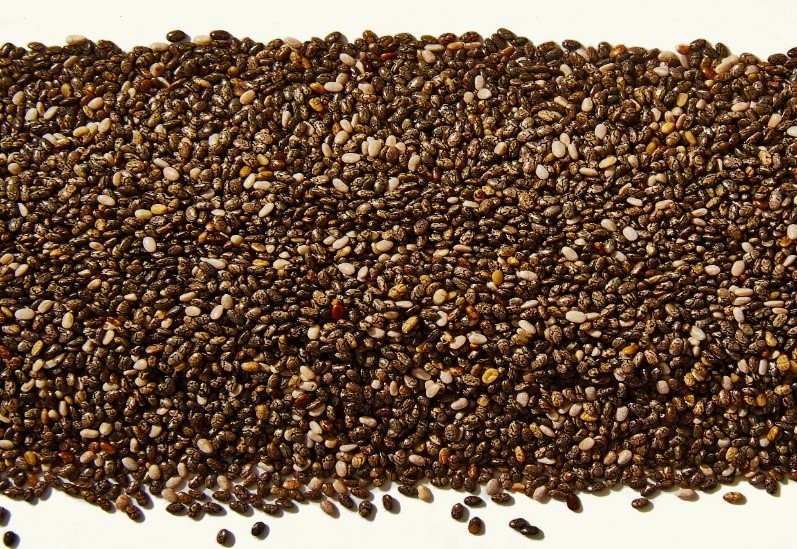
Chia seeds (Salvia hispanica) is a species of flowering plant in the mint family. They are loaded with omega-3 fatty acid. Chia seeds benefits include promoting healthy skin, reducing signs of aging, supporting the heart and digestive system, building stronger bones, and more.
Historically, although today they can be found around the world, they were originally grown in Mexico, where the seeds were highly valued for their medicinal properties and nutritional value. In fact, they were even used as currency at one point says Link, 2019.
Link, 2019, is of the view that, the chia seed is nutrient-dense and packs a punch of energy-boosting power. Aztec warriors ate chia seeds to give them energy and endurance, claiming that just one spoonful of chia could sustain them for 24 hours. Chia means “strength” in the Mayan language, and chia seeds were known as “runners’ food” because runners and warriors would use them as fuel while running long distances or during battle.
Today, the chia seeds nutrition profile has become the subject of increasing research in the scientific community, with more and more studies uncovering a wide array of potential chia seeds benefits and cementing its status as a potent superfood.

Nutrition Facts
About 28 grams of chia seeds contains approximately:
- 137 calories
- 3 grams carbohydrates
- 4 grams protein
- 6 grams fat
- 6 grams dietary fiber
- 6 milligram manganese (30 percent DV)daily Value
- 265 milligrams phosphorus (27 percent DV)
- 177 milligrams calcium (18 percent DV)
- 1 milligram zinc (7 percent DV)
- milligram copper (3 percent DV)
- 8 milligrams potassium (1 percent DV)
Additionally, chia seeds also contain several essential fatty acids; vitamin A, vitamin B, vitamin E and vitamin D; and minerals, such as iron, iodine, magnesium, niacin and thiamine.
Scientific Studies on health benefits
Dermatologically friendly
Chia seeds are loaded with antioxidants, which support the skin health. A study by Martinez-Cruz et al, 2014, found that, chia seeds have a total antioxidant concentration nearly two times higher than previously reported.
In fact, the antioxidant activity of chia seeds was shown to stop up to 70 percent of free radical activity. Chia seeds is loaded with high-antioxidant foods, hence, helps fight premature aging and protect the skin cells against free radical damage to improve the health of your skin.
Improves Digestive Health
Chia is loaded with fiber, hence, adding just one grain of chia seeds into your daily diet can give you 44 percent of your fiber needs for the day. Due to their rich fiber content, chia seeds benefit digestive health by promoting regularity and increasing stool frequency to prevent constipation. The fiber also acts as a prebiotic to provide fuel for the beneficial bacteria in the gut, which plays a central role in many aspects of health and disease.
Also, according to Vuksan et al, 2010, the fiber in chia seeds also absorbs a good amount of water and expands in the stomach, helping to keep you feeling fuller for longer. With regards to this, clinical studies demonstrates that using chia seeds for weight loss could be effective by curbing hunger and suppressing appetite.
Support Heart Health
one of the most powerful chia seeds health benefits is their ability to reduce inflammation and decrease several risk factors of heart disease. Inflammation can put extra strain on blood vessels and is thought to contribute to heart disease along with a slew of other chronic conditions.
One study by DiNicolantonio et al, 2014, demonstrates that, the Omega-3s in chia seed work to protect the heart by lowering blood pressure, cholesterol levels and inflammation. Also, another study by Bazzano, 2008, found that, the fiber found in chia seeds can help manage cholesterol levels and keep the arteries clear to minimize the risk of coronary heart disease.
Balance Blood Sugar
Chia seed is very rich in both alpha-linolenic acid and fiber, evidence from several studies suggests that chia seeds can help maintain normal blood sugar levels to fight diabetes and insulin resistance. One animal model conducted by Chicco et al, 2009, revealed that adding chia seeds to a high-sugar diet prevented changes in blood sugar and lipid levels.
Another, human studies conducted by Ho et la 2013, found that adding chia seeds to white bread reduces the glycemic response to prevent spikes and crashes in blood sugar levels.

Improves endurance
Chia seeds are used by athletes to optimize endurance and boost exercise performance. One study by Illian et al, 2011, agrees that consuming chia seeds enhanced exercise performance for workouts that lasted 90 minutes the same way a sugar-laden sports drink would but without all the unhealthy sugar.
In the study, half of the athletes drank 100 percent Gatorade, while the others consumed half Gatorade and half chia seed drink. In the end, the runners’ times were matched, but the half-chia group consumed far less sugar.
Another study conducted by Biolo et al 1997, asserts that, the protein in chia seeds can help build muscle mass and increase strength to help fuel workouts. The study also demonstrates that consuming protein as a post-workout meal can aid in the repair of muscle tissues and can also build new muscle to speed up recovery time between workouts.
Build Stronger Bones
Link, 2019, is of the opinion that, One of the biggest chia seed health benefits is the ability to strengthen bone health and preserve bone density while reducing the risk of serious conditions like osteoporosis. This is because chia seeds are loaded with calcium and manganese, two minerals that are incredibly important for maintaining bone health.
A study by Flynn, 2003, agrees that, about 99 percent of the calcium in your body stored in your bones, calcium serves an important role in maintaining bone strength and density. According to Strause and Saltman, 1987, P,46-55, Manganese is also involved in bone metabolism, with studies showing that a deficiency in this key nutrient can impair bone resorption and decrease bone formation. Impressively enough, a single ounce of chia seeds contains 18 percent of the calcium you need in a day while also meeting 30 percent of your daily manganese requirements to help build stronger bones.
Supports Weight Loss
Link, 2019, further posits that, Chia seeds also rank among the top plant-based protein foods, which is why chia seeds protein is great to consume for those trying to put on lean muscle, burn fat, and manage hunger and appetite.
For instance, one study by Weigle et al 2005, demonstrates that increasing intake of protein can promote weight loss by curbing cravings and cutting caloric intake. The study further demonstrates that increasing protein intake by just 15 percent of daily calories led to significant decreases in energy intake and appetite. Another study by Blom et al 2006, proved that, high-protein diet rich in foods like chia seeds could reduce levels of ghrelin, the hormone responsible for stimulating hunger.
Fights Cancer Growth
Chia seeds are rich in alpha-linolenic acid (ALA), a type of omega-3 fatty acid found in many plant foods. In 2013, an in-vitro study found that ALA helped limit the growth of both breast and cervical cancer cells. Researchers also found that it caused cell death of the cancer cells without harming the normal healthy cells in the body. While more research still needs to be done to find out the deeper implications of ALA on other types of cancer, this is a great discovery for women struggling with these increasingly common types of cancer. This discovery also makes chia seeds potential cancer-fighting foods.
Enhance Oral Health
Link, 2019, opined that, chia seeds are packed with calcium, phosphorus, vitamin A and zinc, it’s no wonder that promoting oral health makes the list as a top benefit of chia seeds. “Calcium is the building block of your teeth that is necessary for maintaining oral health. Meanwhile, zinc prevents tartar by keeping plaque from mineralizing onto your teeth and has an antibacterial effect that keeps bad breath germs away. Vitamin A and phosphorus are also important for strong teeth and a healthy mouth, both of which are plentiful in chia seeds”.
Chia seeds in Ayurveda and Traditional Medicine
According to Ayurveda, chia seeds can help nourish the blood and promote regularity, thanks to their ability to absorb water in the gastrointestinal tract, forming a gel-like substance. Chia seeds can also reduce inflammation, promote kidney health and support proper hydration.
Chia seeds were also originally grown in Central and South America and were used as a natural remedy to enhance endurance and provide strength to warriors. In fact, these ancient civilizations believed that chia seeds possessed supernatural powers and attributed much of their stamina to the super seed.
Chia Seeds vs. Flax Seeds vs. Hemp Seeds
Chia seeds, flax seeds and hemp seeds are the three most popular varieties of seeds for their crunchy texture, mild flavor and the wealth of chia seeds benefits that they can provide. All three are rich in fiber and protein and make valuable additions to a vegan or vegetarian diet for their medicinal properties and extensive nutrient profile.
However, chia seeds contain the highest amount of fiber and are especially rich in soluble fiber, which can help lower cholesterol levels, reduce appetite and promote regularity. They are also easy to digest, and unlike other types of seeds, they can be consumed either whole or ground. Plus, they boast a good amount of several other micronutrients, including calcium, manganese and phosphorus.
Flax seeds pack in the most omega-3 fatty acids per serving, which is important for reducing inflammation and preventing chronic disease. Flax seeds are also high in lignans, which are plant compounds that acts as an antioxidant and have been linked to protection against cancer and heart disease. Unlike chia seeds, however, flax seeds need to be ground up before consumption in order to maximize the potential health benefits.
Compared to chia seeds and flax seeds, hemp seeds pack in the highest amount of plant-based protein per serving. They’re also rich in magnesium, zinc and iron, three minerals that are essential to many aspects of health. However, they also contain a much higher ratio of omega-6 to omega-3 fatty acids, a nutrient which most of us get too much in our diets already. Experts typically recommend keeping this ratio as low as possible to relieve inflammation and prevent chronic disease.

Risks and Side Effects
There are very few side effects associated with chia seeds, and the chia seeds benefits typically outweigh any risks when consumed in moderation as part of a balanced diet.
There has been some conflicting research about the effect of chia seeds on prostate cancer, however. However, a study conducted by Brasky et la 2013, on the effects of ALA on prostate cancer proved that this fatty acid could increase the risk of prostate cancer, but the study was later shown to have some bias. This study contradicts the earlier study conducted by Carayol et al, 2010, which showed that, ALA did not increase prostate cancer risk and actually decreased the risk in participants.
However, Link, 2019, agrees that, there are occasions where, some people may experience stomach discomfort when consuming chia seeds, especially in large amounts, due to the high fiber content. As with any food, eat in moderation and always drink plenty of water. If you have any concerns or experience any persistent side effects, consider decreasing your intake and be sure to discuss with your doctor.
Take home:
- The chia has a good amount of protein, fiber, omega-3 fatty acids, and important minerals like manganese, calcium and phosphorus — thus explaining why chia seeds benefits are so plentiful.
- Chia seeds benefits further include increased weight loss, better blood sugar levels, improved heart health, enhanced regularity, increased weight loss and more.
- You can soak, grind or enjoy whole for a nutritious and delicious way to boost the benefits of your diet and take advantage of the multitude of chia seeds benefits.
The writer is on a mission to provide you and your family with the highest quality nutrition tips, scientific herbs and healthy recipes in the world.
DISCLAIMER This post is for enlightenment purposes only and should not be used as a replacement for professional diagnosis and treatments. Remember to always consult your healthcare provider before making any health-related decisions or for counselling, guidance and treatment about a specific medical condition.
The writer is an honorary Professor of Holistic Medicine & Naturopathic Physician-Vinnytsia State Pedagogical University, Ukraine. President, Nyarkotey College of Holistic Medicine and currently, LLB law student. Contact: 0241083423/0541234556
Reference
- Martínez-Cruz O, Paredes-López O. Phytochemical profile and nutraceutical potential of chia seeds (Salvia hispanica L.) by ultra high performance liquid chromatography. J Chromatogr A. 2014 Jun 13;1346:43-8. doi: 10.1016/j.chroma.2014.04.007. Epub 2014 Apr 13. PMID: 24811150.
- Vuksan V, Jenkins AL, Dias AG, Lee AS, Jovanovski E, Rogovik AL, Hanna A. Reduction in postprandial glucose excursion and prolongation of satiety: possible explanation of the long-term effects of whole grain Salba (Salvia Hispanica L.). Eur J Clin Nutr. 2010 Apr;64(4):436-8. doi: 10.1038/ejcn.2009.159. Epub 2010 Jan 20. PMID: 20087375.
- DiNicolantonio, J. J., Niazi, A. K., McCarty, M. F., O’Keefe, J. H., Meier, P., & Lavie, C. J. (2014). Omega-3s and cardiovascular health. The Ochsner journal, 14(3), 399–412.
- Bazzano LA. Effects of soluble dietary fiber on low-density lipoprotein cholesterol and coronary heart disease risk. Curr Atheroscler Rep. 2008 Dec;10(6):473-7. doi: 10.1007/s11883-008-0074-3. PMID: 18937894.
- Chicco AG, D’Alessandro ME, Hein GJ, Oliva ME, Lombardo YB. Dietary chia seed (Salvia hispanica L.) rich in alpha-linolenic acid improves adiposity and normalises hypertriacylglycerolaemia and insulin resistance in dyslipaemic rats. Br J Nutr. 2009 Jan;101(1):41-50. doi: 10.1017/S000711450899053X. Epub 2008 May 20. PMID: 18492301.
- Ho H, Lee AS, Jovanovski E, Jenkins AL, Desouza R, Vuksan V. Effect of whole and ground Salba seeds (Salvia Hispanica L.) on postprandial glycemia in healthy volunteers: a randomized controlled, dose-response trial. Eur J Clin Nutr. 2013 Jul;67(7):786-8. doi: 10.1038/ejcn.2013.103. Epub 2013 Jun 19. PMID: 23778782.
- Illian TG, Casey JC, Bishop PA. Omega 3 Chia seed loading as a means of carbohydrate loading. J Strength Cond Res. 2011 Jan;25(1):61-5. doi: 10.1519/JSC.0b013e3181fef85c. PMID: 21183832.
- Biolo G, Tipton KD, Klein S, Wolfe RR. An abundant supply of amino acids enhances the metabolic effect of exercise on muscle protein. Am J Physiol. 1997 Jul;273(1 Pt 1):E122-9. doi: 10.1152/ajpendo.1997.273.1.E122. PMID: 9252488.
- Flynn A. The role of dietary calcium in bone health. Proc Nutr Soc. 2003 Nov;62(4):851-8. doi: 10.1079/PNS2003301. PMID: 15018485.
- Linda Strause and Paul Saltman, 1987, P, 46-55. ISBN13: 9780841214330eISBN: 9780841211995
- Weigle DS, Breen PA, Matthys CC, Callahan HS, Meeuws KE, Burden VR, Purnell JQ. A high-protein diet induces sustained reductions in appetite, ad libitum caloric intake, and body weight despite compensatory changes in diurnal plasma leptin and ghrelin concentrations. Am J Clin Nutr. 2005 Jul;82(1):41-8. doi: 10.1093/ajcn.82.1.41. PMID: 16002798.
- Blom WA, Lluch A, Stafleu A, Vinoy S, Holst JJ, Schaafsma G, Hendriks HF. Effect of a high-protein breakfast on the postprandial ghrelin response. Am J Clin Nutr. 2006 Feb;83(2):211-20. doi: 10.1093/ajcn/83.2.211. PMID: 16469977.
- Rashmi Deshpande, Prakash Mansara, Snehal Suryavanshi and Ruchika Kaul-Ghanekar, 2012. Alpha-linolenic acid regulates the growth of breast and cervical cancer cell lines through regulation of NO release and induction of lipid peroxidation. Journal of Molecular Biochemistry.
- Theodore M. Brasky, Amy K. Darke, Xiaoling Song, Catherine M. Tangen, Phyllis J. Goodman, Ian M. Thompson, Frank L. Meyskens, Jr, Gary E. Goodman, Lori M. Minasian, Howard L. Parnes, Eric A. Klein, Alan R. Kristal, Plasma Phospholipid Fatty Acids and Prostate Cancer Risk in the SELECT Trial, JNCI: Journal of the National Cancer Institute, Volume 105, Issue 15, 7 August 2013, Pages 1132–1141, https://doi.org/10.1093/jnci/djt174
- Carayol M, Grosclaude P, Delpierre C. Prospective studies of dietary alpha-linolenic acid intake and prostate cancer risk: a meta-analysis. Cancer Causes Control. 2010 Mar;21(3):347-55. doi: 10.1007/s10552-009-9465-1. PMID: 19921446.









